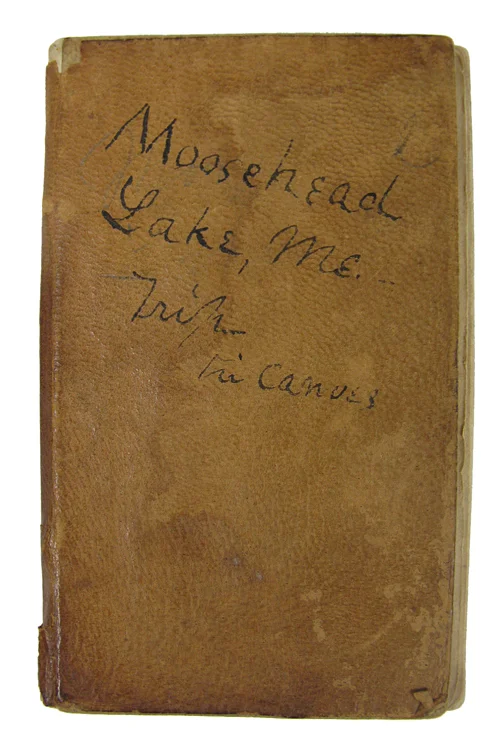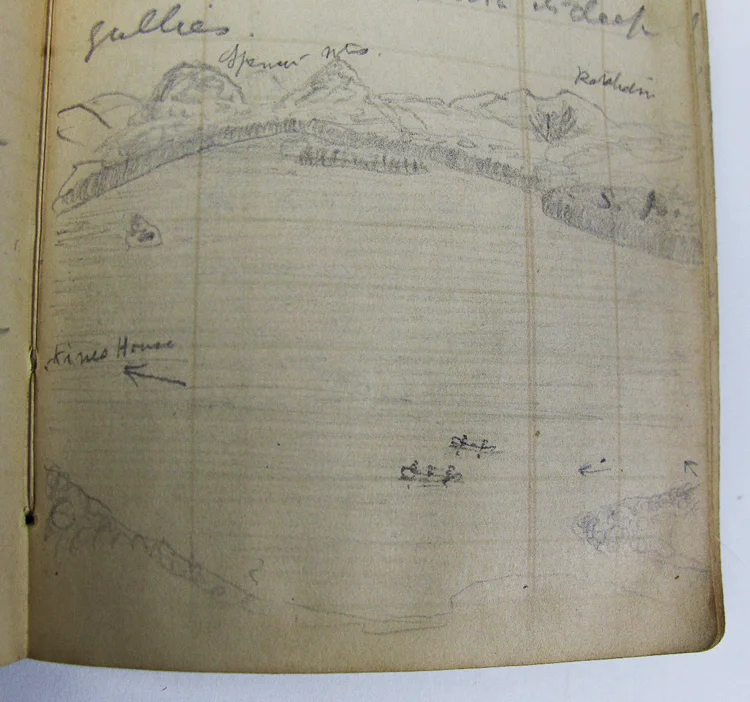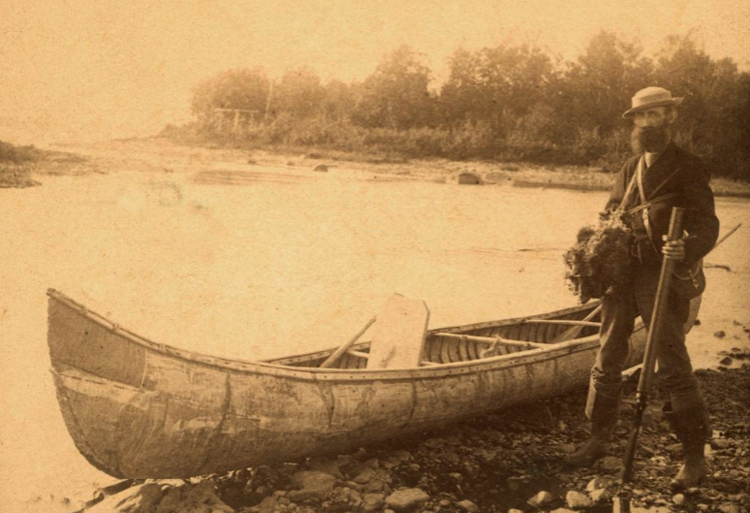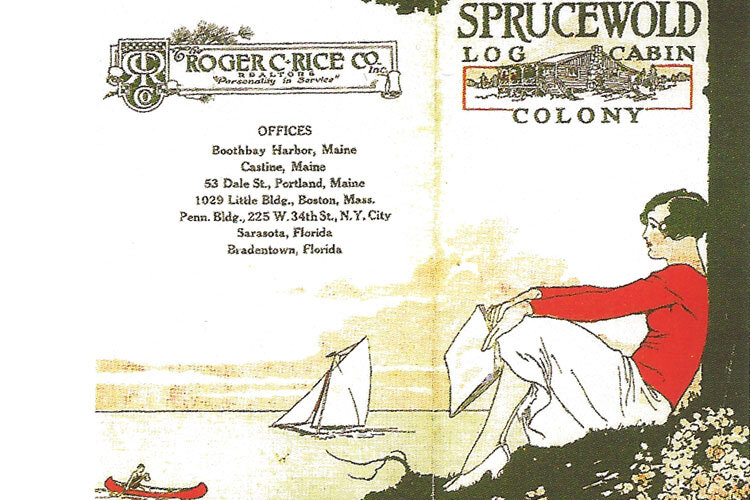Historical Canoe Trip Journal
1864 canoe trip journal
This small (3” x 5”) leather-bound journal documents a canoe trip taken by five men in two birch bark canoes in the Moosehead Lake region of Maine during the Civil War. The diary, titled “Moosehead Lake, ME. Trip in Canoes,” was kept by L. G. Barrett of Newton, Massachusetts from August 22 - September 13, 1864.
1864 canoe trip journal Moosehead Lake Maine
All entries are in pencil so luckily have not faded and are readable—albeit with the help of a magnifying glass to interpret the small, cursive handwriting. There are 77 pages of writing, plus the author’s name, hometown, and date on the flyleaf, and trip expense tallies on the endpapers.
There are also 9 charming small sketches.
Barrett's sketch showing two canoes traveling up Moosehead Lake toward Kineo House, with Spencer and Katahdin Mountains to the east.
Barrett’s chronicles provide descriptions of traveling to and within Maine during the time period, as well as insights into the personalities and adventures of the canoe trippers. Rich historical details are packed into the journal’s pages.
The Region and Canoe Trip Itinerary
Moosehead Lake is the largest lake in Maine (40 miles long x 10 miles wide), with 400 miles of shoreline, a maximum depth of 230’, 40 islands, and a famous geological feature called Mount Kineo whose cliffs rise 700’ straight up from the lake shore.
Mt. Kineo cliffs (image: mainememory.net)
By 1864, Moosehead Lake and Greenville, Maine, the town on its southern shore, were already bustling with lumbermen passing through on their way to northern forests, and well-to-do rusticators and sportsmen visiting the elegant Kineo House hotel.
Kineo House on Kineo Point, Moosehead Lake, c. 1880 (image: mainememory.net)
The first steamboats had begun providing ferry service along the length of the lake in 1835, providing access to hunting camps, farms, and villages before railroads were built. By 1900, 25 steamboats were actively transporting people, livestock, mail and supplies up the lake on regular schedules.
Two steamboats docked on Moosehead Lake, c. 1890 (image: mainememory.net)
Barrett and his canoe tripping party planned to paddle up Moosehead Lake from Greenville, portage across the Northeast Carry to the West Branch of the Penobscot River, and then go downriver to Chesuncook Lake, and thus into the true wilderness of Maine.
It is plausible that their trip itinerary was influenced by the writings of fellow Massachusetts adventurer Henry David Thoreau who had lived in Concord, just 15 miles northwest of Barrett’s hometown of Newton. Thoreau’s book, The Maine Woods, published posthumously in 1864, documented a canoe trip up Moosehead Lake, over to Chesuncook Lake and beyond. One can imagine the men from Newton being inspired to visit this area that Thoreau so eloquently described.
Chronology of the Trip with Journal Excerpts
The following provides some daily highlights of the trip, along with photographs gleaned from the internet that provide images of what the men were experiencing (although most of the photos are from a slightly later time period, taken after the 1888 introduction of the first roll film camera which made it easier for travelers to take photos).
L.G. Barrett was the journal keeper, and his companions were John, George, Bunker and Warren. L.G. refers periodically to all but John as Brother (“Bro.”). Although those three men could have been his literal brothers, it is more likely that they all belonged to the same religious group (an inference based on worshipful journal entries), perhaps Quaker, Nazarene, or Mennonite.
Unlike many canoe trippers of that time period (including Thoreau) who hired guides who were usually Native Americans, these men did not have a paid guide. However, Bunker seems to be an experienced outdoorsman, as they rely on his navigation, paddling, fishing and hunting expertise. Although John, too, seems to have been a good hunter, and George was a “most excellent cooke.”
Northern Maine lake campsite in 1896 (image: mainememory.net)
Bunker had probably lived in Maine for some time, as they camp one night on a site where Bunker had once built a cabin. He was perhaps in Maine temporarily to work as a lumberman; at the end of the trip they depart from him in Guilford, Maine until “we see him at home again in Newton.”
L.G. abbreviates many words throughout the journal (not unlike modern-day texting), which was perhaps the typical journal writing style of the time, or perhaps he was just making judicious use of his small notebook. Words in parentheses within the excerpts below are ones that we could not quite discern.
In 1864, traveling from Boston to Greenville, Maine to begin the canoe trip took several days by steamship (along the coast and up one of Maine’s major river systems, the Kennebec or Penobscot), horse-drawn cart, and foot. So the journal begins and ends with descriptions of that journey, with the pages between describing the canoe trip itself, during which L.G. names each of their campsites to commemorate a significant event, feature, or discovery that occurred there.
August 22, 1864 (Monday) – Boston to Portland, Maine
Three men (“John, Bro. Grg., and myself”) depart from Boston on a Monday night aboard the steamship “Forest City” for Portland, Maine.
"We had a pleasant ride to Portland, a rough one from P. to the mouth of the Kennebec. From there we had a beautiful ride up the river to Augusta."
Photo of the Forest City steamship that the men took to Portland. The smaller steamship in the foreground is the size of the boat they would have taken from Augusta to Skowhegan. (image: archive.hnsa.org)
August 23 (Tuesday) – Portland to Augusta, Maine
They take another steamship up the coast from Portland to the mouth of the Kennebec River in Bath then north upriver to Augusta where they change boats.
View of Bath, Maine from the ferry landing, c. 1845 (image: mainememory.net)
Arial view of Merrymeeting Bay, Maine
He mentions some of the sites, such as the shipbuilding city of Bath, Merrymeeting Bay, and the U.S. Arsenal in Augusta “a fine granite building on the left bank of the river.”
Arsenal on the bank of the Kennebec River, Augusta, Maine. (image: centralmaine.com)
“We changed boats at Hallowell taking a smaller craft bringing us close down to the water and making it very pleasant.”
August 24 (Wednesday) – Augusta to Skowhegan, Maine
They continue up the Kennebec River on the small steamboat until arriving in Skowhegan where they meet another member of their party, Warren. Warren, who may have been living in Maine, seems to have been responsible for coordinating some of the trip logistics, such as gathering provisions. They spend the night in Skowhegan with someone named Wheeler.
“Arrived in Skowhegan 36 mls. fr. Augusta at 6 P.M. Wes. Eve. Found Warren waiting for us several days. The hard tack was also ready.”
Hardtack (image: survivalnewsonline.com)
August 25 (Thursday) – Skowhegan to Greenville, Maine
The three Massachusetts men leave Warren (who will rejoin them on Moosehead) in Skowhegan and continue on foot, walking the remaining 50 miles to Greenville, although L.G. writes:
“I was obliged to ride the last 6 mls being foot sore.”
August 26 (Friday) – (Moosehead Lake) Boarding House
The three men obtain a birch bark canoe in Greenville for their trip, and paddle a ways up Moosehead Lake, spending the night on the floor of a lumberman’s boarding house, where they chat with other men about their trip plans and await the arrival of the remaining two members of their party.
“We three (Jn., Grg. & Myself) bot. a good canoe (which J. got for $21 with paddles).”
“This A.M. went out in the high birch bark canoe. Found it delightfully easy & swift.”
Birch bark canoe and hunter with a string of ruffed grouse on Moosehead Lake in 1883. A similar scene is described in Barrett's journal (image: mainememory.net)
“Found fr. conversation with men who have been to Chesuncook that the 'rapids' are not so very bad."
L.G. also mused about the local political climate:
“The people up here are mostly (I suppose) Union, but still Copperheads* abound. This place is no (retreat) for the secess. supporters. An officer was prevented last week fr. taking away a deserter.”
(*Copperheads was the name for a faction of northern Democrats, also called Peace Democrats, who opposed the Civil War and wanted an immediate peace settlement with the Confederates.)
August 27 (Saturday) – (Moosehead Lake) Boarding House
They are windbound on the lake, so spend the day hunting and exploring, and stay another night at the boarding house.
“Well here we are sitting on the shore 2 1/2 mls fr. Greenville. We have just backed out from an attempt to (set) out for the “Outlet.” The waves were high altho’ we had got part loaded.”
“Our first proceeds of hunting, two squirrels, red ferrets, wh. J. has just brot. in after a tromp in the woods.”
August 28 (Sunday) – (Moosehead Lake, Moose Island) “Prayer Meeting Camp”
After receiving word that another member of their party (“Bro. Bunker”) had finally arrived in Greenville, they set out to meet him and his canoeing partner Warren, the same man who had met them with provisions in Skowhegan.
“This A.M. after breakfast of johnnycake & squirrel (which was quite sweet) we went down (towards) town.”
Together the five men in two canoes paddled back up the lake to Moose Island where they had a prayer meeting and set up camp. This is the first indication that they were quite religious.
“Bro. Bunker read after we had sung “Rock of Ages” and offered prayer. We then sang and prayed & had a most heavenly time, here in the woods, with nothing but the canopy of heaven above us, and the western Zephyrs shook the foliage of the forest about us and at the rocks at our feet the waves roared, our hearts seemed in harmony with Nature, to praise & worship the God of the Universe & our Heavenly Father. Bro. Bunker then spoke of the importance of keeping a phil. frame of mind while on the trip & especially we must exercise a kind & forgiving spirit toward each other.”
Moose Island, Moosehead Lake, Maine (image: terragalleria.com)
August 29 (Monday) – (Moosehead Lake) “Camp Fossil”
They continue traveling up the lake “with a prosperous wind & good paddling” towards The Outlet, which is the headwaters of the Kennebec River flowing out of Moosehead Lake.
They take time to fish, reporting that they
“Managed to get two for breakfast. They were splendid salmon trout – yellow & reddish & sweet as honey. Bunker pulled one of some 3 or 4 lbs. almost to landing but lost him.”
(image: mainememory.net)
Later, however, they had an ordeal coping with wind:
“It was settled that we stick to the left for some miles. But the result was well nigh disastrous.”
Their two boats got separated in the wind and nearly capsized. Once they reached the campsite they
“Joyfully congratulated each other on the narrow escape we had been allowed. Our Heavenly Father had been good to us.”
“Warren & myself found several fine geological specimens. This was Camp Fossil.”
“Fine dinner of Grg.’s hoe-cakes wh. we think the best yet.”
“All slept well including Warren who was well nigh used up.”
Barrett's drawing of Moosehead Lake from Greenville to the Northeast Carry.
August 30 (Tues) – (Moosehead Lake) “Camp Illumination”
They camp again on Moosehead as they continue heading north to the Carry. They build a huge fire that evening, which led to the naming of the campsite Camp Illumination.
“It looked splendid as the dense forest became illuminated.”
August 31 (Weds) - (Moosehead Lake at the Northeast Carry) “Bunker’s Camp”
They camp on the Moosehead shore at the Northeast Carry into the West Branch of the Penobscot.
“Bunker’s 3 partridges make a fine dinner.”
“We call this Bunker’s camp because there was a log cabin wh. he made some three yrs. before, when he came up and stayed six weeks. It was a very good one, but someone had partly pulled it down.”
Northeast Carry to the West Branch, c. 1920 (image: mainememory.net)
Sept. 1 (Thurs) – (West Branch of the Penobscot) “Camp Porcupine”
They camp on the “Three-mile Rips ten mls. from Lake Chesuncook.”
They hunted partridge that day, and got 5. They also unwittingly shot another animal, as recounted in this amusing entry:
“We had not pushed off when we heard heavy thumping on the shore. We listen, it recurs – a bear, certain! Bunker jumps up, looks around a little, then pop goes the gun. Jn. can stand it no longer and we let him ashore. Another pop. I know the bear is dead sure. I jump ashore to help drag the carcass, when lo! it is not a cub, not even a deer, but a porcupine! We succeed in getting its body into our canoe, & are on our way.”
Barrett's drawing of "Camp Porcupine." Note the porcupine carcass hanging from a pole in upper right corner.
Sept. 2 (Fri) – (Lobster Pond) “Camp Jollity”
They take a short side trip up Lobster Stream into Lobster Pond where they spend the night.
“Made the biggest fire of the occasion. Altogether we had a pleasant time & in consequence we named the camp 'Jollity'.
Lobster Lake, c. 1890 (image: mainememory.net)
Sept. 3 (Sat) – (West Branch of the Penobscot) “Camp Shipwreck”
Saturday was the climax of the trip as they had a canoeing catastrophe in the Half-Mile Rips.
“Our way is (delayed) with accident – the 1st one of the trip.”
L.G. describes in great detail how hey struggle to maintain control of the canoe in the rapids, and finally come up against a large rock in mid-stream:
“I jump out to lift her off as does Jn. at his end. But no use, she fills fr. the down current on her broadside. Grg. is out too, but the boat is nearly full of water & has already cracked clear across her middle … But she can be mended so as to be quite strong.”
Finally Bunker comes downstream behind them, and he and John get the boat off the rock and bail it out.
“During all this Grg. remains standing on the rock, he being unable to get off without getting wet. But like Rob. Crusoe, he took it philosophically & waited till Bunker floated him his pole & he was able to balance himself so as to pull off his boots. He then waded ashore. Altogether, after all, it was a most laughable scene. Jn. & Bunker in the broken canoe, L wading and traveling against the current, & Grg. on the desolate isle in midstream.
Barrett's drawing of "The Catastrophe.”
“In the melee Jn. & I each lost a boot so that our two pairs are lost. Grg’s haversack also went overboard but was soon found.”
After the disaster, they eventually make camp.
“We soon had a roaring fire & I finally succeeded in getting warm. We built a fine camp & had a good supper after wh. I felt better. We had, to me, by far the pleasantess evening of the trip.”
Sept. 4 (Sunday) – (West Branch of the Penobscot) “Camp Shipwreck”
The next morning they search the river but are unable to find their lost boots. They have a meeting to assess how many days they have left before having to catch the steamship home from Bangor on “Monday next.”
Worried about meeting their Bangor rendezvous, they reluctantly make the decision not to push forward to Chesuncook Lake, so stay another night at the same campsite.
“We are very sorry not to reach Chesuncook, especially being within 2 mls. of it. But so it must be, and adieu to any further explorations into the wilderness. Had a pleasant day.”
Sept. 5 (Monday) – (West Branch at Lobster Brook) “Camp Welcome”
On Monday morning they start poling upstream on the West Branch to return to Moosehead the way they came, through various rapids. It is tough going as the journal’s record of the day’s commands from Bunker in the stern reveal:
“The 2nd rif is a tough one. Pull: Now, with all your might! Don’t let her head round! There – Now she goes! Oh! Wasn’t that a pull! Another and another and so on, tugging away at our poles. Keep her straight in the current! But we advance, altho’ it is hard work.”
“Now an adventure! I am pulling my pole quite hard when it slips off a stone & I lose my balance, the canoe slides out under me & down I go, a regular full length plunge into the water. After a brief while our canoe man himself loses his balance & over goes into the same as my element.”
“Our case called forth a hearty laugh from the others who have not been wet. But be not too jolly, boys, your turn may come yet!”
Poling up the West Branch of the Penobscot River, c. 1920 (image: mainememory.net)
They stop for a while to hunt,
“But partridge do not like to be shot, & as for ducks they have no idea of it. They become (coy) with canoes full of hungry men! Not a bit of it! And they allow you just a short glimpse and bid you adieu.”
They reach their campsite at 7 pm, cold, tired and hungry, but then after a “pleasant night of fire & hearty food” they decide to call their site "Camp Welcome."
Sept. 6 (Tues) – (Moosehead Lake) “Camp Urania”
They pole and paddle the final 2 miles upriver back to the Carry where they buy supplies of milk, molasses & potatoes (which inspires L.G. to list the entire contents of his pack) before walking the portage. They reach the lake at 11 A.M. then paddle down it for 14 miles.
However, they once again encounter their old nemesis, the wind, which had built up waves to white caps along the enormous length of the lake.
“On we go at very good speed … The waves seem mountainous high compared to so small a thing, but really are about 6 ft. the highest. Sometime we are 1/3 out of the water & when a big billow behind strikes us the (canoe) is as if a feather & (the wave) rolls on under us carrying us with it until it rolls forth fr. under the bow when down we go with a (splash), hurled forward a rod. It is fun after all, & she rides them like a dude. It is wonderful what a high canoe can weather.”
Later, however, they find the wind to be less fun, as they have to round a point to make for shore, seemingly as it is getting dark:
“But how can we turn into big waves? There is a chance! No, on again. There’s one! Yes; about with her, quick! All right, now boys we’ll go forward and round the point safely. Boys what an escape! We almost shudder to think of it. God has saved us. On, on, on in the clear moonlight.”
Illustration of waves on Moosehead Lake's North Bay, looking toward Mount Kineo.
They finally settle into camp 2 1/2 miles above Mount Kineo. They name their campsite after the Greek Muse of astronomy, Urania, after sleeping out in the open under a clear and starlit sky.
“It was very pleasant lying down on the boughs with nothing above but the forest trees and blue sky beyond studied with stars. I enjoyed it much, flat on my back with such a (peace) above and a roaring fire at my feet.”
Stars over Moosehead Lake (image: scottsnyder.com)
Sept. 7 (Weds) – (Moosehead Lake) “Camp Moosehead House”
They have a short day of paddling in order to take a hike up Mount Kineo, and along the way “have a splendid feast” of blueberries and huckleberries.
Table rock at the base of Mount Kineo (image: mainememory.net)
“The view from the top is most delightful, the lake stretched out for 20 mls … Little did one suppose that such a lake was so treacherous!”
A view from Mount Kineo, c. 1900 (image: mainememory.net)
“Altogether the view was one long to be remembered & the finest lake view I have seen. But the boys are in a hurry so we must be down.”
It was a cold, windy day, so when they find a logger’s cabin with the name “Moosehead House” chalked over the door, they spend the night there.
Sept. 8 (Thurs) – (Moosehead Lake) “Camp Dry Up”
On their final day on the lake, Bunker gets up at 5:00 am to fish.
“He caught some 15 small ones & we have a trout breakfast. The duck from yesterday forms an excellent dish when roasted.”
Trout catch northwest of Moosehead Lake, c. 1887 (image: mainememory.net)
“At about 7 P.M. we land in Greenville after 150 mls. in canoes. Behold Greenville! How pleasant is the sight of that little church steeple!”
Village of Greenville, circa 1890 (image: ebay.com)
They sleep on a sand beach near Greenville where they have “a general wash-up” in the lake, and thus name the campsite "Camp Dry Up."
Sand bar on Moosehead Lake (image: mainiememory.net)
Sept. 9 (Fri) thru Sept. 11 (Sun) - Greenville to Bangor, Maine
In Greenville they sell their canoe back at the warehouse where they had obtained it just two weeks before.
“And we must bid adieu to the little ferry with whom we have so long (traveled). We have been so long in her that it feels like home … over the waves in this little thing of life; & we leave her indeed with regret. In due time we land her in the old warehouse where we took her & succeed in selling her for fourteen dolls. (2/3 her cost). I feel pretty well satisfied. Our canoe therefore has cost us seven dollars or $2.33 a piece.”
“Left Greenville at 8 A.M. and start for Bangor on foot some 63 mls. Having lost my boots I am obliged to walk in Bunker’s slippers wh. I find quite easy tho’ not very solid.”
They take three days to walk from Greenville to Bangor, although they do catch some rides in carts. It pours rain during some of their trek. They part ways with Bunker in the town of Guilford. There is no further mention of Warren, so perhaps he had departed from them in Greenville.
Sept. 12 (Mon) – (Penobscot River) Bangor, Maine
The three original travelers, John, George & L.G., arrive in Bangor and board a steamship to travel down the Penobscot River, out to the coast, and onward down to Boston, about a 24-hour trip.
“We had a rough passage – at night the boat rocked badly, however we got a tolerable sleep.
The steamer "Penobscot" on the Bangor to Boston route. (image: penobscotmarinemuseum.org)
Sept. 13 (Tues) – Newton, Mass.
L.G. Barrett arrives home in Newton where he writes his final journal entry.
“At last got in safely at about 7 A.M. Went at once home & found the folks at breakfast.”
“I am now once again in my study, after walking 125 mls, paddling in a canoe 150 mls., & riding in steamboats & carts some 500 mls, making in all about 775 mls. perhaps 800 mls. of traveling at a cost of $24.”
“I thank Gd. for all His watch, care & protection, thru all this journey.”
As the journal comes to an end, we are left wanting to know more about the men whose adventure we’ve vicariously shared. How old were they? Were they married with families? What were their occupations? Why were they not off fighting in the Civil War? Were they conscientious objectors? We’ll leave these questions to be answered by another analyst who has the time and inclination to do additional sleuthing through historical records.
Perspectives from Today
Having canoed the same Moosehead to Chesuncook route ourselves, it is interesting to make comparisons between 1864 and modern-day canoe tripping. In 1864 wilderness travelers were free to hunt, kill and eat any animal, at any time of year. They were definitely not low-impact campers, as they regularly cut balsam boughs to sleep on, and cut and gathered lots of wood and birch bark to have huge fires every night.
The West Branch of the Penobscot River has also changed since 1864. We were surprised to read of the men’s ordeal in rapids approaching Chesuncook Lake on the West Branch, as there are no longer any rapids there to speak of. But the rapids did once exist, as described in a 1902 handbook (In Pine-Tree Jungles: A hand-book for Sportsmen and Campers in the Great Maine Woods):
“(on) the West branch, quick water is encountered for about two miles below Lobster Stream to Warren Island….Several small islands dot the stream below here, and rough water is encountered most of the way to the lake. Pine Steam falls, where Pine Stream pours its waters into the river, are passed six miles below the Half-way house.”
The reason that those rapids are no longer there is that a 92’ high dam (Rippogenus Dam) was built from 1915-20 on Rippogenus Lake downstream on the West Branch from Chesuncook Lake, which raised Chesuncook's level and thus flooded the area where the West Branch flowed into it. The original rapids that foiled Barrett's party are now submerged.
It is also interesting that the 1864 trippers essentially rented a birch bark canoe, much as trippers might rent a canoe for a trip today, although the transaction was not called “renting” at the time.
Instead they bought a canoe for $21 and sold it back at the same warehouse for $14, in essence renting it for two weeks for $7—which was a bargain indeed, given that they had wrapped the canoe around a rock and cracked it “clear across her middle.” So, there was obviously no pesky damage clause to sign in an 1864 sales/rental agreement.
Despite the differences in canoe tripping practices over the past 150 years, we were also struck by the similarity in the general arc of a canoe trip with friends: Beginning with an anticipatory journey to the put-in, getting acclimated to the scenery and routines of camping, having harrowing adventures yet pulling through relatively unscathed, developing in-jokes with fellow trippers, having a few rest days to explore beautiful surroundings, and hating to see the trip come to an end while also looking forward to returning to the comforts of home and family.
But perhaps the most notable similarity in canoe tripping across centuries is the universal feeling of rejuvenation that traveling through wild areas provides. Thoreau said it best:
“We need the tonic of wildness ... At the same time that we are earnest to explore and learn all things, we require that all things be mysterious and unexplorable, that land and sea be infinitely wild, unsurveyed and unfathomed by us … We can never have enough of nature.” -Henry David Thoreau, 1854
The concluding line of L.G. Barrett’s 22-day journal reiterates more simply the continuity of Thoreau’s truism:
“(I) can say that I am profited in much every way, in health of body and of soul.”
(image: destinationmoosehead.com)








































